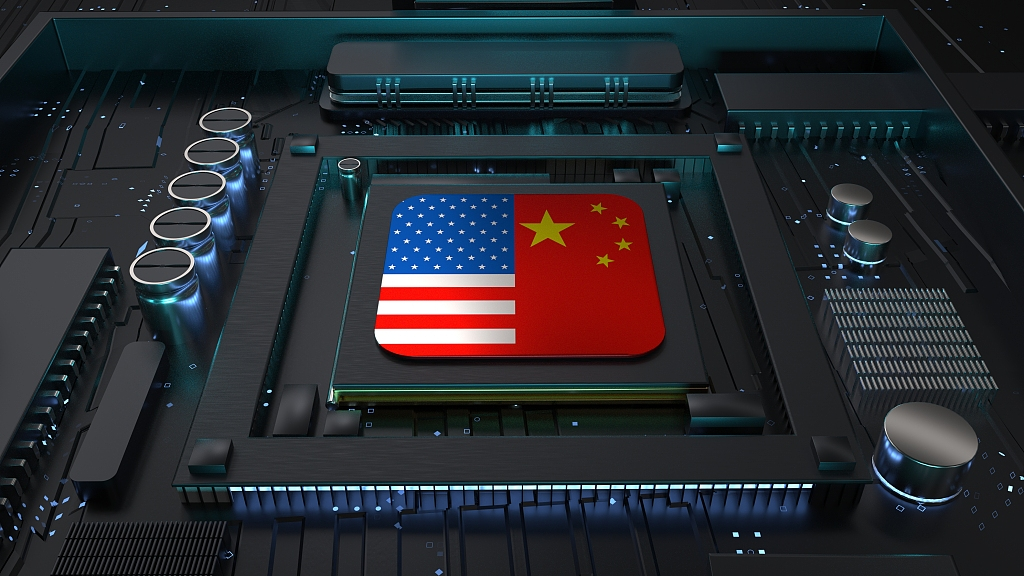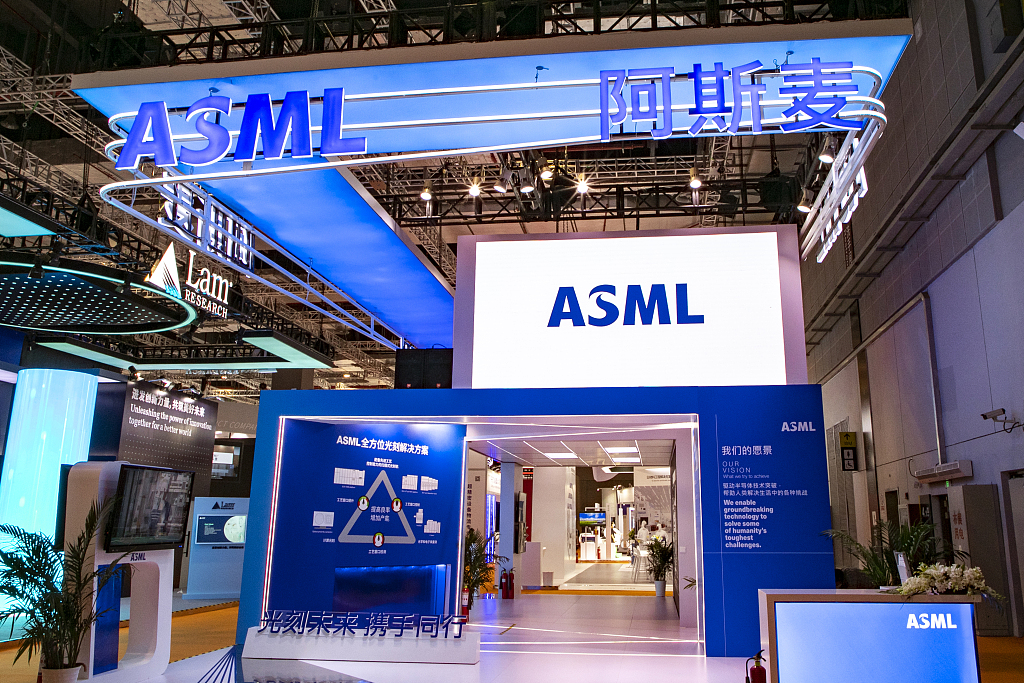
Editor's note: Hafijur Rahman is a columnist and Security and Strategic analyst, working in a prominent Strategic Studies Center in Bangladesh. The article reflects the author's opinions and not necessarily the views of CGTN.
The pressure is high but the stakes are even higher – America's tech-giant allies, particularly Japan, South Korea, and the Netherlands, are under constant pressure from the United States to mirror its export-curbing measures on China's semiconductor industry, aimed at hobbling China's technological progress.
The Joe Biden administration has spent nearly a year instigating its allies to wage a tech war against China. In early October, Biden unilaterally issued their "most aggressive measures to date," according to the Washington Post, preventing Chinese firms from accessing cutting-edge semiconductors produced anywhere in the globe using American machinery or expertise.
But the U.S. has not stopped there to get its allies to join Washington, knowing that the unilateral actions it has put into place will "lose effectiveness over time if other countries don't join," said a senior administration official to reporters. White House officials have been flying from one country to another, to enlist allies. America, as one Taiwan expert said, is eliciting from its allies "voluntary compliance" and if it cannot, "[it] is going to bring the hammer down"– flexing unilateral muscles by exploiting its tech leverage to strong-arm others into compliance.
Washington's building more multilateral efforts on its unilateral bids is facing increasing backlash from its allies as disapprovals are running high among the allies getting "bossed around" and dragged into America's "Manichean power struggle."
The Netherlands, home to ASML, a crucial supplier of chip-manufacturing technology, said it would not slavishly follow the U.S. into placing export restrictions on China's semiconductor industry. In recent days, Dutch Foreign Trade Minister Liesje Schreinemacher has granted interviews and spoken to lawmakers in the Dutch Parliament, saying Amsterdam will do what's in its "national interest" and "economic interest."

The booth of ASML, a Dutch semiconductor equipment supplier, at the fourth China International Import Expo, in Shanghai, China, November 9, 2021. /CFP
The booth of ASML, a Dutch semiconductor equipment supplier, at the fourth China International Import Expo, in Shanghai, China, November 9, 2021. /CFP
Additionally, reluctance has looked obvious in Japan's toeing of Washington's lines to support American efforts to limit China's access to advanced semiconductors, manufacturing equipment, and related goods and services. When it comes to semiconductors, America's long-time ally Japan doesn't hesitate to challenge American dualistic lines. "Our interests and your interests are not identical," a Japanese official recalled telling a U.S. counterpart, during an interview with the Economist.
So far, the discussion over the potential fallouts from America's tech war against China, which have started to batter the chips market, have been confined to the realm of cost-benefit analysis. Economic stakes are astronomical for the U.S. allies to yield under relentless U.S. coercive pressure. China accounts for over a quarter of global annual demand for semiconductor equipment. As high-end chip demand continues to grow in China, the impact of U.S. export controls will be detrimental to companies selling to the Chinese market.
The U.S., out of its ignorance and techno-nationalist paranoia, has pushed hard on broad-based technological decoupling with China by rebooting the semiconductor ecosystem under the economically unfeasible "friend-shoring" proposition, which shows disregard for the monumental costs across the tech chain. According to a joint report by the Semiconductor Industry Association and Boston Consulting Group, fully-sufficient local supply chains would require at least $1 trillion in upfront investment, resulting in $45 to $125 billion in incremental recurrent annual operational costs for the entire industry with an increase in chip prices by an average of 35 to 65 percent.
But the tech-giant countries must go beyond the cost-benefit domain in discerning the pressure from Washington. Countries must grasp America's confrontational geopolitical gambit for economic supremacy vis-a-vis China. Washington's political establishment has internalized its foreign policy to imply that the current strategic rivalry between two superpowers would wobble over generations to come. America's ever-escalating economic warfare against China over at least the last four years bears truth to this assumption. What Biden is expanding his predecessor's policy lines against China.
According to the New York Times, the Biden administration is contemplating further controls on biotechnology, quantum information science, and advanced algorithms. And America's "national security" narrative has reached such a paranoid extent that Biden is redefineing existentially important issues for humanity – like advanced clean energy and climate adaptation technologies- as "areas affecting U.S. national security" and as ones that warrant more restrictive measures.
So, falling prey to America's tech warfare doesn't mean incurring monumental economic costs. Rather it suggests tech-giant countries take the risk of getting dragged down into a vicious cycle of a long-term, cold-war-like conflict in which technology is just the tip of the iceberg. In the short run, America's tech assault may hobble China's tech march. But, in the long run, given China's increasing research and development funding (a record $441 billion on research and development last year with the expected increase in the coming years), indigenous innovation advantages, and tech infrastructure, China will bounce back on the preeminent track. The U.S.'s tech war in no way guarantees the demise of the Chinese semiconductor industry, but it does lead to astronomical prices the world would have to pay if there's no push back.
(If you want to contribute and have specific expertise, please contact us at opinions@cgtn.com. Follow @thouse_opinions on Twitter to discover the latest commentaries on CGTN Opinion Section.)